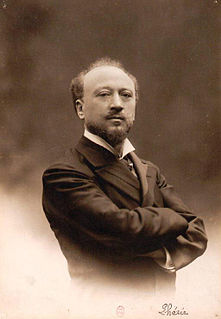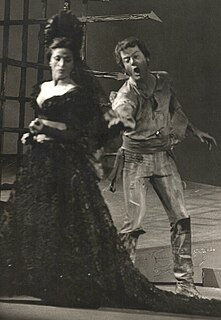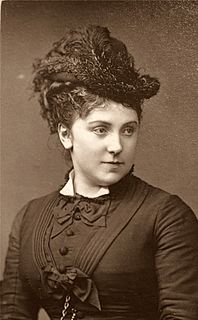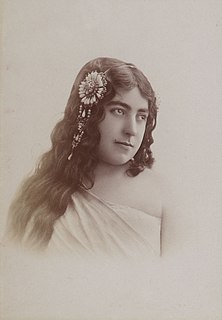
Lucienne Jourfier (17 September 1923 in Toulouse - 10 January 2017 in Paris) was a 20th-century French operatic coloratura soprano.

Lucienne Jourfier (17 September 1923 in Toulouse - 10 January 2017 in Paris) was a 20th-century French operatic coloratura soprano.
Her father, Gaston Jourfier, a renowned painter and professor at the city's Fine Arts School, was already creating sets for the Théâtre du Capitole de Toulouse. Her aunt, Germaine Bailac of the Paris Opera, was in her day a celebrated singer in Paris: she had begun at the Opera in 1907 in the role of Delilah, and was later a much sought-after Carmen.
Jourfier approached music by entering the conservatory of her hometown in the viola class. It was at the age of 19, when she was working as an accompanist in the singing class, that she made a name for herself and joined the same singing class at the Toulouse Conservatory. She obtained her first prizes unanimously from the jury in June 1943, already being noticed by the directors of the lyrical theatres present, including that of the Capitol, who offered to hire her in his troupe.
She nevertheless insisted on obtaining her prizes in Paris, and entered the Conservatoire de la Ville de Paris a few months later in March 1945, in the class of Paul Guillamat, the father of singer Ginette Guillamat. [1] She won her first prizes, again unanimously, in June 1945, just six months after she had entered the singing class at the Conservatoire de Paris. She sang the same aria as during the entrance contest, the "Scene of Madness" of Lucia di Lammermoor , with variations of Lily Pons. It is on the occasion of the contest for the students of this singing class that the composer and conductor Reynaldo Hahn noticed this 21-year-old girl, and hired her to begin on the prestigious stage of the Palais Garnier the following August during the revival of Mozart's The Magic Flute , in which she had Mado Robin, Paul Cabanel and Henri Médus as partners. Thus Jourfier made her debut at the Paris Opera on 10 August 1945 in the role of Pamina, aged 21. She remains to this day the youngest singer of the Paris opera.
Also in 1945, Jourfier made her debut at the Salle Favart in the role of Sophie in Werther . Subsequently, she sang Leila of Les Pêcheurs de perles , Philine of Mignon, Violetta of La Traviata , Micaela of Carmen , Suzanne of The Marriage of Figaro , La Guimard of Gabriel Pierné's Fragonard [2] (with Fanély Revoil and Jacques Jansen), Mimi of La Bohème , Messager's Monsieur Beaucaire which she sang with Jacques Jansen, Rosina of The Barber of Seville ... She was chosen to play this Rosina on screen when it was decided to produce a film production of Rossini's opera in 1948 under the musical direction of conductor André Cluytens. Jourfier responded there to Raymond Amade, Roger Bourdin and Roger Bussonnet.
At the palais Garnier, besides Pamina, she was Gounod's Juliette (1947), and it was to her that Maurice Lehmann entrusted the task of resurrecting "Amour" of Rameau's Les Indes galantes in the 1952 revival with Géori Boué, Denise Duval, Janine Micheau and Jacqueline Brumaire.
She also played in Massenet's Manon , which was the role in which she left a great memory.
The young woman announced that she was leaving the Paris Opera in 1953. Maurice Lehmann continued to consider her a full member of his troupe. But nothing did: Lucienne Jourfier continued to perform live, less and less often, and gave up her career definitively in 1956, at the age of 32.
Being bound by an exclusive contract with the Paris Opera, Jourfier could only exceptionally participate in recording sessions. She nevertheless leaves a handful of discs, among which are the main arias of Massenet's Manon . For the same reasons, her career in the provinces and abroad was rather limited, the artists under contract with the Opera at the time having the possibility to perform on other stages only during their holidays (i.e. in July in early August). Jourfier was nevertheless able to meet audiences in North Africa and Geneva; but it was in Monte-Carlo that she represented the Paris Opera and the French singing school, particularly during the 1952 season. Raoul Gunsbourg, then director of the Monte-Carlo Opera asked her to come and sing in 'his' "house of the Bohemians", a performance which moved both the public, and the princely family, and her partner, the great tenor Giacomo Lauri-Volpi.
There are a very large number of radio recordings of this singer in the Institut national de l'audiovisuel archives.
Lucienne Jourfier died in Paris at age 92.

Paul Lhérie (Lévy), was a French tenor, then baritone, and later a vocal teacher. He was most famous for creating the role of Don José in Bizet's Carmen.
Hong Hei-Kyung, often known in the west as Hei-Kyung Hong, is a South Korean operatic lyric soprano.

Janine Micheau was a French operatic soprano, one of the leading sopranos of her era in France, particularly associated with lyric soprano and coloratura soprano repertory.
Andrée Esposito is a French opera singer, a lyric soprano particularly associated with the French repertory and contemporary works.

Georgette "Géori" Boué was a French soprano, particularly associated with the French repertory, especially Marguérite, Thais and Salomé (Massenet). She was born in Toulouse. Following her career in France and other European centres, she was a teacher and "perceptive observer of the French operatic scene".
Mary Elizabeth Mills is an American opera singer.
Jacqueline Brumaire was a French operatic soprano and later teacher.

Lucienne Bréval was a Swiss dramatic soprano who had a major international opera career from 1892 to 1918. Although she appeared throughout Europe and in the United States, Bréval spent most of her career performing with the Paris Opera where she became a greatly admired interpreter of French grand opera roles and Wagner heroines. She also specialized in the works of Gluck and Rameau, becoming particularly associated with the title roles in Gluck’s Armide and Rameau's Hippolyte et Aricie. A favorite of the composers of her day, such as Massenet and Dukas, Bréval sang in numerous world premières during her career.

Marie Rôze, was a French operatic soprano.
Lillie Grandval was a French soprano, active in opera and operetta for over 30 years, and described as "One of the most popular French singers of her generation".
Andréa Guiot was a French operatic soprano. A long-term member of the Paris opera houses, she was known internationally for leading roles especially in the French repertoire, such as Gounod's Mireille and Marguerite, Massenet's Manon and Micaëla in Bizet's Carmen. She appeared as Micaëla when Carmen was first performed at the Opéra de Paris in 1959, and as Mireille in the 1000th performance of the opera at the Opéra-Comique. She performed in the world premiere of Poulenc's Dialogues des Carmélites at the Teatro Colón in Buenos Aires in 1965. Among her many recordings, the 1964 Carmen conducted by Georges Prêtre, with Maria Callas in the title role and Nicolai Gedda as her lover, brought her lasting fame. She appeared at major opera house in France, Europe, and the Americas. After retiring from the stage, she was a voice teacher at the Conservatoire de Paris, succeeding Janine Micheau, her own former instructor.

Suzanne Sarroca is a 20th-century French operatic soprano.

Georgette Bréjean-Silver was a French opera singer.
Suzanne Catherine Cesbron-Viseur was a French soprano and singing teacher.
Caroline Dumas is a French soprano considered as "probably the most emblematic student of the lyrical singer Charles Panzéra".
Anne-Catherine Gillet is a Belgian operatic soprano.

Marie Sophie Jeanne Laisné was a French operatic soprano with the Opéra-Comique. She started her career as Sophie in the first French production of Massenet's Werther, and went on to create the roles of Aurore in Jules Massenet's Le portrait de Manon, Jeanne in Benjamin Godard's La Vivandière, La Duchesse de Fronsac in Henri Hirschmann's L'amour à la Bastille, and Henriette in Ernest Lefèvre-Dérodé's Le follet. Other notable roles include Micaela in Bizet's Carmen and as Mimi in Puccini's La bohème.
Renée Gilly was a French operatic mezzo-soprano. She was a long-time principal member of the Opéra-Comique, where she performed leading roles such as Massenet's Charlotte, Mascagni's Santuzza, and Bizet's Carmen. She appeared in world premieres and sang as a guest at major opera houses in Europe.

Elsa Dreisig is a French-Danish operatic soprano. Based at the Berlin State Opera, she made a European career in both opera and concert. Her opera roles include, besides the standard lyric soprano repertoire such as Mozart's Fiordiligi and Bizet's Micaëla, Baroque opera such as Rameau's Hippolyte et Aricie, and the world premiere of Beat Furrer's Violetter Schnee.

Marguerite Vaillant-Couturier (1855–1930) was a French soprano who made her debut in Brussels at La Monnaie in 1878 in the title role of Gounod's Mireille. After appearing in Marseille the following year, she sang in operettas in Paris in the early 1880s. On 19 October 1882, she created the role of Micaëla in Lecocq's Le coeur et la main at the Théâtre des Nouveautés in Paris. In 1888, she gained success in the title role of Bizet's Carmen at the Opéra-Comique. She also appeared in Buenos Aires and Saint Petersburg.